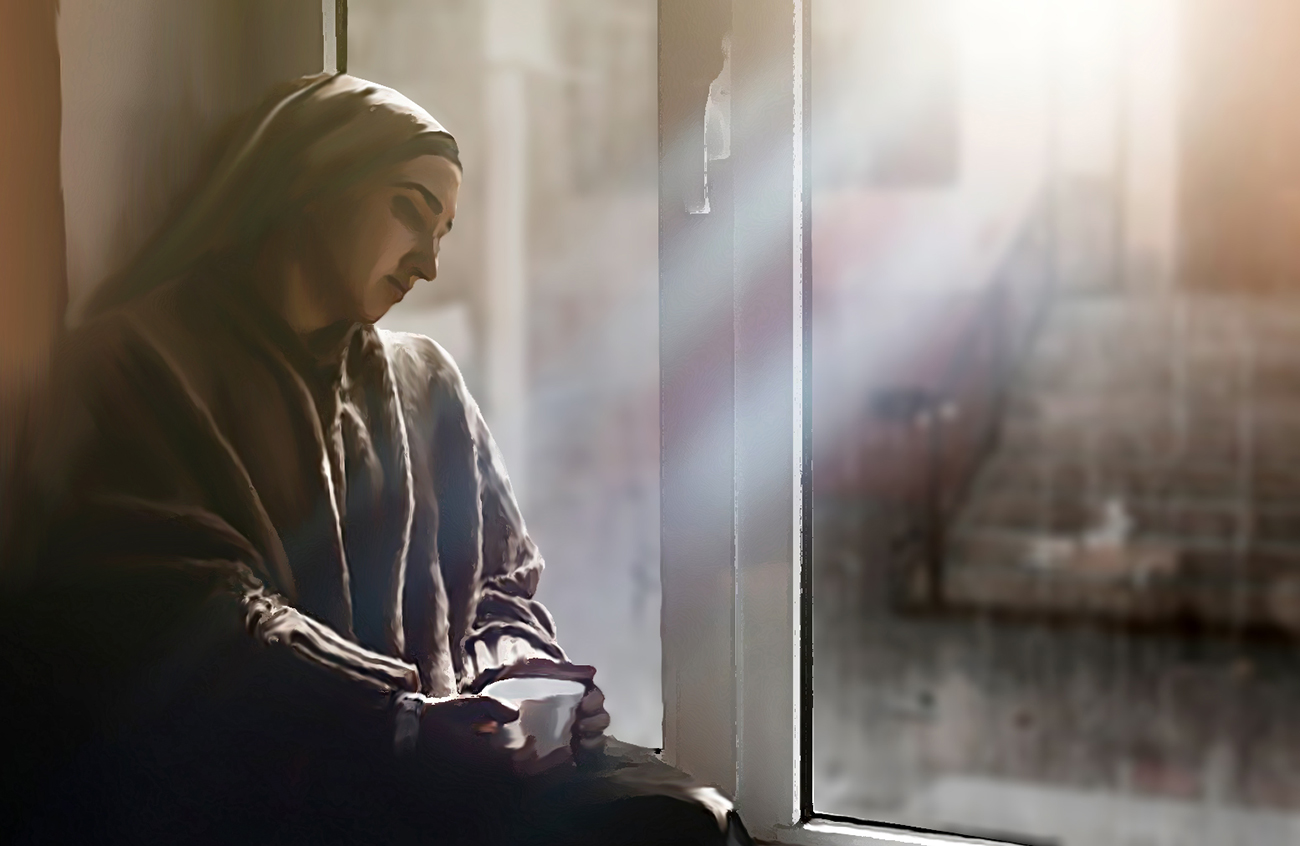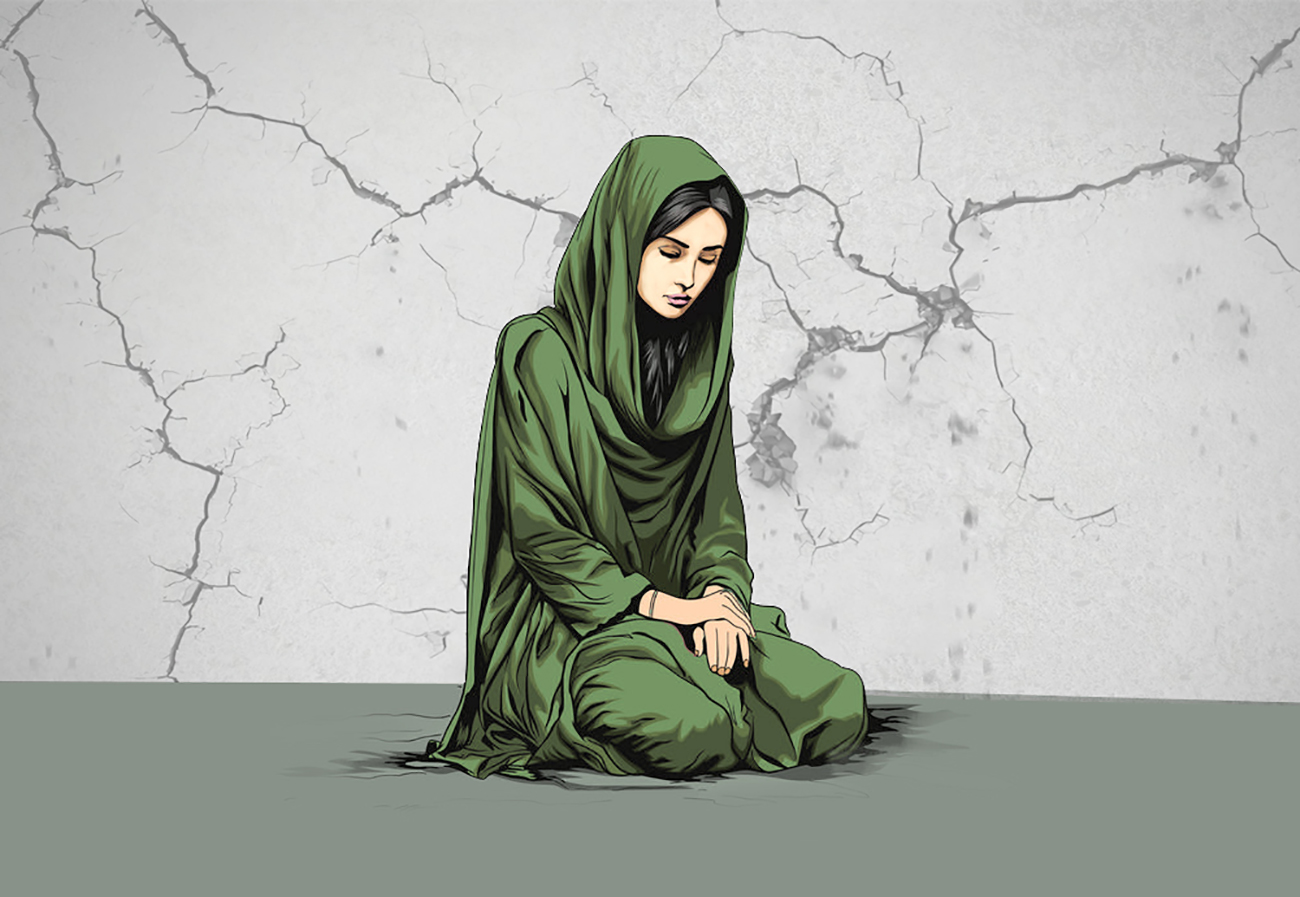Depression and other psychiatric issues are health crises that impact families and relations more seriously unlike all other diseases, reports Humaira Nabi

In a room adorned with faded and peeling wallpaper, twilight struggles to penetrate the heavy curtains, forming patterns on the rumpled floor. The scent of sterile linen hung in the air, enveloping a frail young woman cocooned in a blanket. Nuzhat, once a beautiful and cheerful woman, was struck with paraplegia (lower body paralysis) a few months ago, following a prolonged battle with clinical depression spanning over four years.
Nuzhat found herself entangled in a complex web of mental health struggles, physical hardships, and a crumbling marriage. She had been shunned by her in-laws and abandoned by her husband, along with her two children, in her parents’ home.
Diagnosed with depression a year after giving birth to her first child in 2019, Nuzhat’s husband initially stood by her side, offering support as she navigated the challenges of her mental health. However, after the subsequent birth of their second child in 2021, Nuzhat’s mental health deteriorated further, and her husband gradually drifted away.
“He used to attend to her every need. They were the epitome of a perfect couple when she was in good health. But now, he is an entirely different person. Now, he doesn’t call her anymore,” Nuzhat’s younger sister lamented.
Two years ago, Nuzhat came back to her parent’s home for the birth of her second child. Since then, her in-laws, and her husband, have not made any effort to reach out and encourage her to return home.
While her parents dutifully cared for the children, they struggled to help their daughter with the state of her marriage and deteriorating mental health. Though they loved and supported her wholeheartedly, they recognised the limits to fully addressing the complex issues she faced.
In their ongoing struggle, their world shattered one fateful morning when Nuzhat could not move her legs. She was rushed to the hospital and treated for over a month. Her mental health worsened due to the new challenges posed by her physical condition.
“If her husband supported her, it could ease her suffering,” Nuzhat’s mother said as she wiped away tears. “It is heartbreaking to see her losing her will to live. She seems to just be waiting for death now.”
Not Alone
Nuzhat’s story highlights the struggles many women in Kashmir face. Mental health issues plague marriages. The growing mental health crisis in Kashmir strains relationships, especially burdening women. Overwhelmed, women like Nuzhat find their marriages put to the test as they battle inner demons.
Dr Ubaid Rasool, a psychiatrist at the Institute of Mental Health and Neurosciences (IMHANS) in Srinagar, has extensive experience supporting women who balance their marriages and mental well-being.
The doctor believes that mental health challenges can impact intimate relationships. “Marriages naturally face various pressures and stressors. Women might feel confused or frustrated due to their inability to contribute, struggle with household tasks, experience emotional limitations, have difficulties with in-laws, and lose motivation to socialize,” the doctor said. “These factors can strain a marriage, leading to feelings of disappointment, rejection, and a sense of detachment.”
Dr Ubaid further explained that as exhaustion and frustration accumulate, the emotions can deteriorate into anger or resentment. This decline in emotional and social support can impact overall well-being and the entire relationship.
No Access
Women in Kashmir often encounter barriers when attempting to access mental health support during a crisis. Traditional gender roles, societal norms, and expectations frequently exacerbate these obstacles. The stigma associated with being labelled as ‘mentally ill’ if they seek professional assistance prevents many women from reaching out for the help they need.
Shaheena, a woman in her late twenties, struggled to get help for her anxiety and depression. Her in-laws called her mad, intensifying her suffering. They exploited her breakdowns as an excuse to mistreat her, dismissing her struggles as just madness.
“You are mad. Tell your parents to take you to a mental hospital,” Shaheena painfully recalls her in-laws taunting. Her mental health struggles strained her marriage. Her mood swings and behaviour changes distanced her husband. Her mother-in-law insisted she was possessed, so he took her to faith healers for exorcisms, worsening her mental health. Finally, a friend directed them to a psychiatrist.

Though medication and therapy offer hope, the initial lack of empathy from her husband left deep scars.
“Our marriage is silent now. We rarely talk,” Shaheena said regretfully. “I feel responsible for the strain. My husband stays for the kids. I am unsure if I will recover, but I know our relationship will not be the same.”
The Male Perspective
A Srinagar resident in his early fifties said his wife has lived with life-long depression, the quantum of which alerted in different situations. “What I have personally observed is that the depression victim is perpetually in a self-denial mode and avoids medical consultation,” he said. “In cases, where the patient finally permits a consultation, it still does not get him or her out of the conditioning that he or she had survived with for a long time. The medication barely improves basic but not the overall persona.”
In his case, the man, speaking anonymously, said that a depression patient – in case it is the mother, impacts the entire family and the kids are not excluded. “It takes a lot of effort to keep things afloat always for the sake of children,” he said. “In certain cases, these patients can hide other illnesses till they reach a stage where doctors find it difficult to treat. I know many such cases.”
As the depression peaks, the patients usually get into a shell that gradually triggers self-induced isolation and prevents the patients from seeking or demanding care. It is only in close-knit families where these issues are perhaps better tackled.
Prone to Depression
Studies show women are more vulnerable to mental health issues than men. Before adolescence, depression is equally rare in boys and girls. But with puberty, depression rises sharply among girls and becomes twice as common as in boys.
According to a 2015 Kashmir mental health survey by Médecins Sans Frontières (MSF), 50 per cent of Kashmir women (compared to 37 per cent of men) were reported to have suffered from probable depression; 36 per cent of women (21 percent of men) had a probable anxiety disorder; and 22 percent of women (18 percent of men) were reported to have suffered from probable post-traumatic stress disorder (PTSD).
Dr Umar Jan, a neuropsychiatrist, says women’s vulnerability relates to hormonal shifts across life stages. “Changes during puberty, pregnancy, menopause and postpartum seem connected to higher depression,” Dr Jan said. “Monthly menstrual hormone changes are likely to contribute too.”
Postpartum Depression (PPD) is a tough journey for some new mothers. 50-80 per cent of women have mood changes after birth, like worry, isolation or guilt. These often fade, but 10-15 per cent face intense sadness or anxiety, signalling PPD.
Gulshan, 32, was a medical assistant. After maternity leave, her husband made her bring their baby to work. Juggling work and motherhood with no spousal support left Gulshan isolated and fragile. She developed postpartum depression, overwhelmed with emotions.
“My husband lacked empathy after birth,” Gulshan said. “Going back to work after months was so hard. It made me doubt myself as a mother and left me deeply isolated.”
Upon a co-worker’s suggestion, Gulshan visited a psychiatrist and was diagnosed with PPD. She now receives depression treatment and lives with her parents.
(Names changed upon request.)















